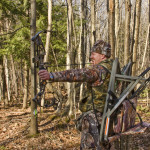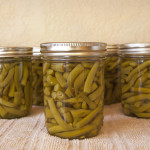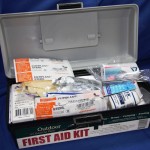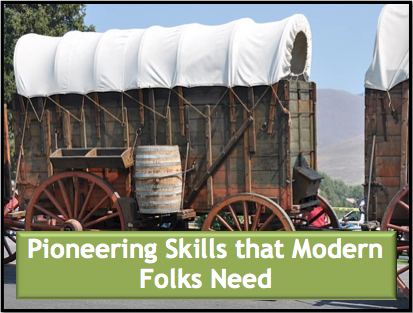If all of the modern appliances were taken away from you, could you survive? Would you be able to cook food, wash and dry clothes, and haul water? Many people have limited knowledge and even less experience with how to live like this but for many of our great grandparents grew up exactly the way mentioned above. For all intents and purposes, they had homesteading and pioneering skills.
Even though we have all of our modern conveniences and electricity to power them, it is wise to have some experience with the absolute basics, just in case. Fellow blogger Shane of Outdoorsmantime.com offered to help me identify some of the most important of these skills that are a must have for basic survival, let alone thriving in this kind of lifestyle.
Skills that Pioneers Had that Modern Folks Need
Homesteading is quickly becoming a powerful movement. Many people are choosing to go back to a simpler life. The American Pioneer helped to settle the land and had a unique skill set that was something that I now long after.
If you are thinking about becoming a homesteader, there are certain skills that you will need to learn and master. Most, if not all of them, are directly related to the skills that pioneers had and that our fore fathers knew too.
Let’s look at a few main areas – Obtaining food, preserving that food, and first aid.
Hunting
 Hunting is a common homestead practice and will allow you to know exactly where your food comes from and how it is processed. For all the hunting techniques, make sure you understand exactly what the laws, regulations, and seasons are for your area. The laws vary greatly from region to region.
Hunting is a common homestead practice and will allow you to know exactly where your food comes from and how it is processed. For all the hunting techniques, make sure you understand exactly what the laws, regulations, and seasons are for your area. The laws vary greatly from region to region.
- Trapping. Trapping, or snaring, is a simple practice where you can snare several different forms of animals. This can both be done for meat consumption and fur usage. To be proficient in trapping, you will need to learn how to make a proper snare and learn to track animals in their local habitat. Be sure you understand your local laws and regulations about snares in your local area. You should set them in place where the target prey travels so look for worn paths. In addition, you will need to cast a wide net, figuratively – So set a lot of them. However, only set snares if you will be checking the snares regularly to tend to the animals that you trap.
- Bow hunting. Cross bow hunting is a popular choice for many hunters. You can hunt many kinds of game including deer, and even turkey, with bow hunting. Bow hunting can be hard for the beginner, but it is worth it to put in the time. Again, you will need to scout out game trails. The best trails are between a food/water source and bedding. It can be difficult to find a spot like that and hunters are not likely to give up their secret spots. If you can find a family member to help you get started on the right track, you can learn much faster. Bow hunting is a great skill to have in case of an ammo shortage or lack of a gun.
- Rifle & Shotgun. Rifles and shotguns can help you to get large and small game including fowl and deer. The big advantages to using firearms are the size of game you can hunt for and the greater distances. The same techniques apply for firearms and bow hunting for finding a good spot to set up your stand.
Food preservation
Preserving the food on your homestead is an important task. Most homesteaders grow and hunt their own and this type of food simply will not hold up to long storage times without proper preservation. There are several ways you can store your food to ensure long-term usage.
 Canning. Canning, both pressure and water bath are a great way to store many different varieties of food. Many of our ancestors used canning as their primary source of food storage. It’s one of the easiest ways to get starting in food preservation. Vegetables and even meats can be canned and will last for a year or more in proper storage conditions. The key is understanding the acidity level of the food. Low acidity foods and meats have to be pressured canned to achieve the high temperature for the right amount of time to be safe. High acidity foods can be canned using the water bath technique.
Canning. Canning, both pressure and water bath are a great way to store many different varieties of food. Many of our ancestors used canning as their primary source of food storage. It’s one of the easiest ways to get starting in food preservation. Vegetables and even meats can be canned and will last for a year or more in proper storage conditions. The key is understanding the acidity level of the food. Low acidity foods and meats have to be pressured canned to achieve the high temperature for the right amount of time to be safe. High acidity foods can be canned using the water bath technique.- Dehydrating. Dehydration is another method of food storage that works well. This type of method can be used to store fruits and vegetables, meats, dairy, and even eggs. Dehydrated foods can last well over a year when stored properly. I usually stick to fruits and veggies, and occasionally I will make a nice batch of beef jerky.
- Fermenting. Fermentation is becoming very popular among homesteaders both for the food preservation quality and health benefits. In fact, non-homesteaders are getting excited about some fermented foods. Fermented foods include sauerkraut, kimchi, beer, and wine. Beer and wine preserve barley and grapes or other fruits, respectively.
Medical Skills
Every homesteader needs to have a certain amount of medical skills. The skills should not be limited to just humans either as homesteaders may have several different forms of livestock on their land that may need medical attention.
If you do not plan on going to the doctor when something happens on the homestead, it is essential to have these skills.
 First aid- general. Every homesteader should be skilled in cleaning wounds, treating bites, treating colds and fevers and even having suture skills. From a prepping perspective, you should be adaptable and flexible with the tools and gear you have on hand. So if you have a paracord bracelet available when you happen to be out in the field, you may need to improvise fashioning a sling with paracord and a branch. You should be comfortable performing CPR, applying a tourniquet, treating shock, and treating a broken limb at a minimum. If major accidents occur, you should certainly seek professional medical attention. Accidents will happen on the homestead and you will have to be prepared in order to prevent loss of life and infections.
First aid- general. Every homesteader should be skilled in cleaning wounds, treating bites, treating colds and fevers and even having suture skills. From a prepping perspective, you should be adaptable and flexible with the tools and gear you have on hand. So if you have a paracord bracelet available when you happen to be out in the field, you may need to improvise fashioning a sling with paracord and a branch. You should be comfortable performing CPR, applying a tourniquet, treating shock, and treating a broken limb at a minimum. If major accidents occur, you should certainly seek professional medical attention. Accidents will happen on the homestead and you will have to be prepared in order to prevent loss of life and infections.- Making salves, tinctures, essential oils. There are many homeopathic treatments out there. Salves can be made out of many different weeds that grow right on the homestead. Salves can be used for a variety of ailments depending on the ingredients, including burns, headaches, help you sleep, treat dry skin, relieve stress, and treat achy muscles. Tinctures can help treat colds and other forms of sicknesses. If you want to have a fully stocked medical kit, consider adding a broad variety of essential oils as these can help treat many different ailments.
Conclusion
Learning skills from what is called a “simpler time” may not be an easy task, and it may take a lifetime to master. The pioneers knew a thing or two about getting things done, adapting to anything, and generally surviving.
We didn’t cover all things related to pioneering and homesteading skills, but just a few main areas. They are a great place to get started for you pioneer skill set. Hunting, food preservation, and medical skills are all necessary skills that a homesteader should have. These skills will ensure long life and successful homesteading.
____________________
I encourage everyone to learn some basic skills and practice them as much as they are able to because you just never know when you may need them. Plus, learning them gets you outside in the sunshine!
You can follow along with Shane on his main page and Twitter!





Thanks a bunch for having me aboard to guest post here! I am a big fan so this is quite an honor…
Glad to have you here! It’s a well written article that makes you think. 🙂
Just exercised 2 of those skills this past week. Shot a doe with a crossbow Saturday afternoon, harvested the meat Sunday morning at deer camp and Monday morning canned over 10 lbs. Did do some minor first aid on a small cut on my thumb, too much knife work 🙂
Kregg, thanks for reading the post! Well done on the doe & canning. How much meat did you get off the doe total?
I hope your thumb heals well and fast. Keep those blades sharp!
loved this article found it useslfule
Thank you! Pull up a chair, grab a cup of something warm and hang out awhile. It’s a nice place to be.
I love that you made Hunting the first of the skills! I learned to hunt long before I arrived at my homestead, and its a skill that has helped me grow into the homesteading life I now have! I want to get better at the medical skills, thats an area I have NO skill at all! On the to do for sure